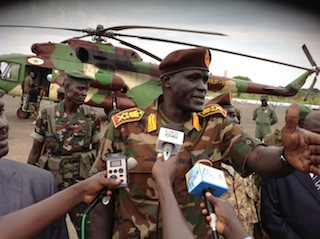Promotion of former rebels sparks tension in South Sudan military
December 1, 2013 (JUBA) – South Sudan appears to be split over the integration of former rebel groups in the young nation’s military, following president Salva Kiir’s appointment of prominent rebel leaders to senior positions last week.

Following months of negotiations, Kiir appointed the leaders of several rebel groups from various locations – mainly the Greater Upper Nile region – to the regular army last week.
These included Bapiny Monytuil, who was appointed as a lieutenant general, while Johnson Uliny, along with four other colleagues, were appointed as major Generals, with Kiir ordering the full integration of their forces. In the same order issued on 25 November, Kiir also named six other brigadier generals.
In a separate order issued on 29 November, Gabriel Tanginye was appointed as a major general, Thomas Mabor Dhol as a brigadier general and Gatwec Joak as a colonel.
The move has drawn widespread opposition from within the military and the general public, with some senior officers questioning the army is serious about security sector reform.
Rebel leader David Yau Yau, who is fighting the SPLA from his base in Jonglei’s Pibor county, accepted Kiir’s amnesty and signed a deal in June 2011 that saw him promoted as a general despite being a civilian before launching his insurgency in 2010 after failing to win a seat in the Jonglei state legislative assembly.
However, Yau Yau rebelled again in April 2012, complaining that despite his title he was not given any real responsibilities. The cycle of rebellions and groups splintering from the SPLA only to be reintegrated and the leaders given senior positions predates the 2005 peace deal prior to the country’s secession from Sudan in 2011.
Nonetheless many South Sudanese do not approve of such pragmatism, with some arguing that such appointments encourage rebellions.
Sabit Marier, a member of the ruling Sudan People’s Liberation Movement (SPLM) – the political wing of the SPLA during the more than two-decade-long civil war – said on Sunday that the rebels had achieved nothing apart from the “killing their own people”.
He argued that rather than being rewarded with senior military posts, rebel leaders “should be held responsible for all the atrocities they committed”, adding that the president’s decision will only “encourage more rebellion”.
Marier said the recent decision also goes against Kiir’s policy of a lean government, with the integration of rebel forces set to greatly increase the size of the armed forces.
Many SPLA generals were retired earlier this year as Kiir attempted to trim the size of the military in order to save money during an oil transit fee dispute with Sudan that was crippling South Sudan’s economy.
Marier fears that increasing the size of the SPLA will affect the national budget as more will be spent on soldier’s salaries rather than providing institutions with funds to deliver services.
A senior military officer, who wished to remain anonymous, said that some soldiers have registered repeated complaints about the lack of promotions from within the army’s ranks.
“Sometimes it makes it difficult for us in the command to convince junior officers and non-commission officers because, according to the conventional system, junior officers move faster than senior officers. It takes three to four years for officers with the ranks of lieutenants and captains and about six to eight years for major and lieutenant colonels to go to the other ranks. We have groups of officers and soldiers waiting commissioning and promotions”, he said.
Another officer said that although Kiir, as the SPLA’s commander-in-chief, was acting within his powers and mandate to promote peace and defend the country’s sovereignty and security, he felt that there could have been a better balance of promotions from within the SPLA and the ranks of former rebels.
“Current ranks are seen as source of money instead of the value of service to the country. I tell you that most of the current commanders cannot run a company when given [an] assignment. Some of them desert assignments during operations, pretending that they are sick”, an officer who did not want to be identified told Sudan Tribune on Sunday.
“So why not commission long-serving, non-commission officers and young officers who have demonstrated ability?” he added.
(ST)
